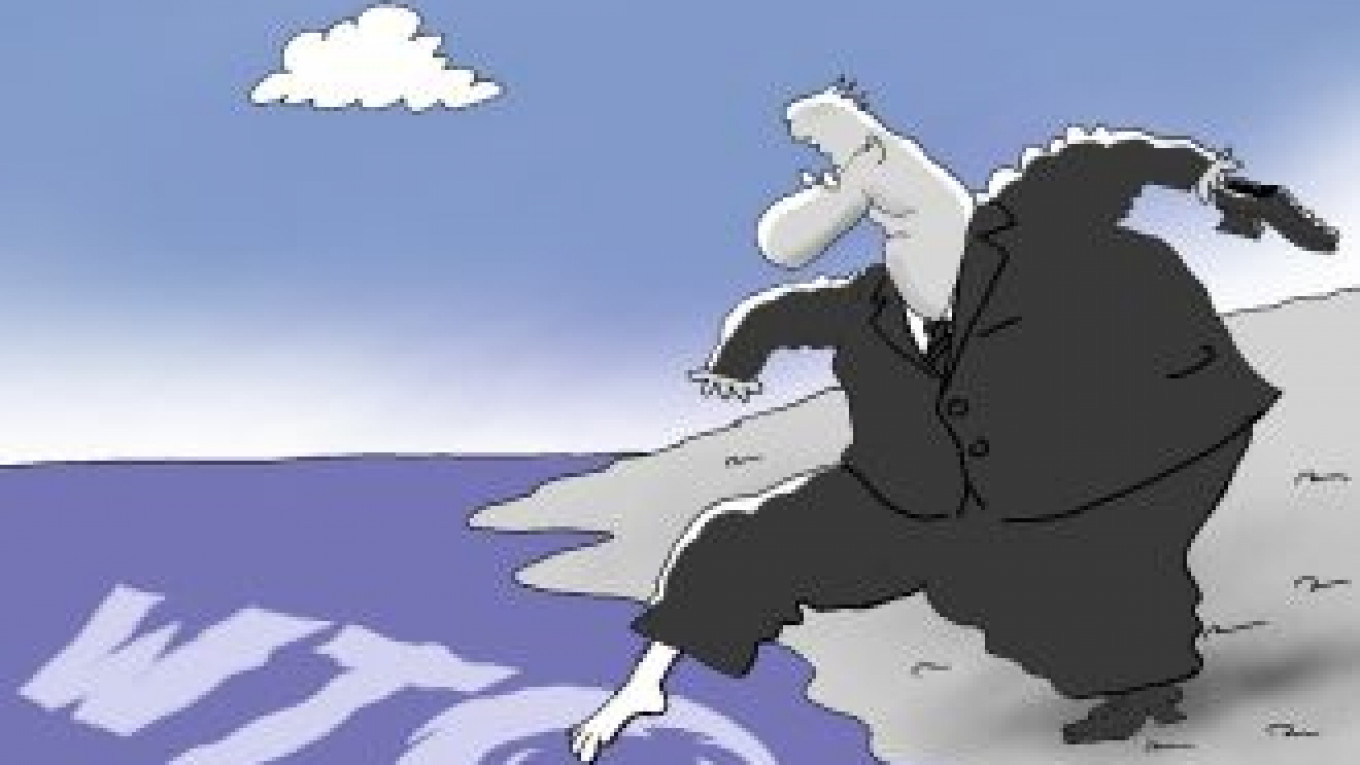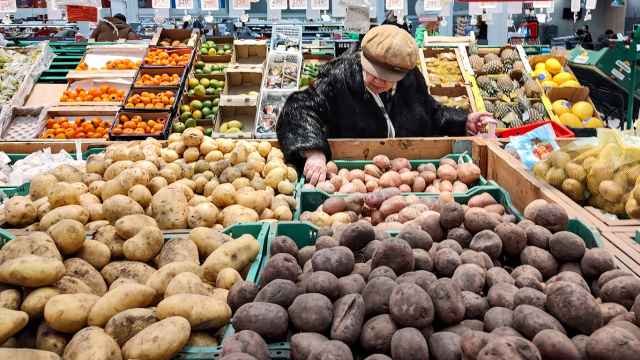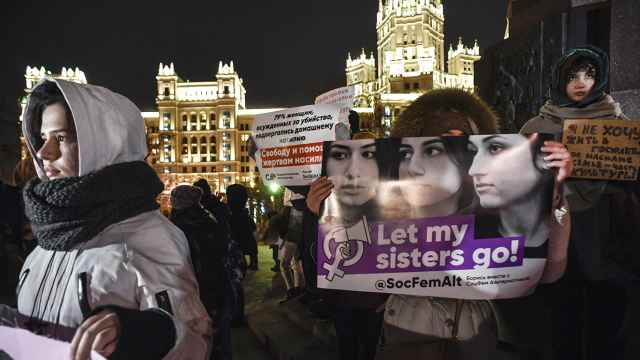On Aug. 22, 2012, Russia was formally admitted as a member of the World Trade Organization after an unprecedented 19 years of negotiations. Although there were some detractors, the Kremlin cited it as evidence that economic reforms are being instituted. This view was generally shared by industry leaders and business groups at home and abroad.
Barely 12 months later, the deal has attracted many more critics in Russia's business community while both the European Union and Japan have brought formal charges against Russia for alleged violations of membership rules. No other country has ever been accused of a violation so early in its membership.
So, is membership actually a really bad idea for the country, as many of the vocal critics are now shouting? Should the Kremlin consider suspending membership, if that is even possible, as some State Duma opposition groups are calling for? Or should it ignore the international criticism and impose even more import tariffs to protect fledgling or inefficient domestic industries as some lobby groups suggest?
The sensible answer to all of these demands is "absolutely not." WTO membership was a major step forward for the country. The membership agreement should be used exactly as intended: as a timeline for domestic industries to get their act together to better compete in quality and price with imported competition.
Let's turn the clock back 12 months and recall what was accepted by a majority of business leaders and economists, according to many surveys. The headline statements were that entry into the WTO would initially cost the federal budget about $14 billion in lost tariff revenue over the first two years, and that some industries — such as the food and light industry manufacturers — would face more immediate import competition than others. Some Duma members have now exaggerated that expected loss to $15 billion annually as they crank up pressure against the trade agreement.
At the same time, however, it was also acknowledged that complying with WTO rules would provide a necessary catalyst for the broader business reform agenda. It was believed that the entry terms allowed enough time for domestic industries to become more competitive. The World Bank estimated that membership could add an additional 3.3 percent to overall gross domestic product, or about $65 billion in the first three years. This is expected to rise to an 11 percent benefit, or $220 billion, within 11 years after WTO membership. Moscow's New Economic School calculated the net membership benefit at a sustainable 0.5 percent addition to annual GDP growth. If you aggregate all those statements you get a well known and universally proven cliché: "no pain, no gain." That was also widely acknowledged and accepted as a necessary tradeoff at the time.
The caveat to all these positive statements, though, remains: " … provided everybody plays by the agreed rules." And that's the rub. Within weeks of joining the WTO, the government imposed an import levy on foreign manufactured light vehicles under the guise of a recycling fee that has not been applied to domestic manufacturers. That levy has added, on average, an extra $3,600 to the cost of an imported vehicle. It also sparked the investigation that has led to formal complaints from the EU and Japan. Looking at it purely from a domestic standpoint, we can see why the levy was imposed: The auto-manufacturing sector is one of the biggest employers in the country and contributes hugely to some regional economies.
Much more important, workers in Tolyatti, the home base for the largest domestic vehicle manufacturer, were among the first and most vocal to take to the streets in the spring of 2009 to vent their anger at the Moscow government. Then-Prime Minister Vladimir Putin was quick to react, delivering a huge injection of state financial aid and attempting to acquire an equity partnership with General Motor's European unit, Opel, to help revise the industry. That deal was subsequently done with Renault-Nissan and the auto-manufacturing industry has recovered strongly. The Kremlin was never going to allow the threat of import competition to grow too quickly. This would undo its expensive rescue and increase the risk that workers might again take to the streets.
In addition to the levy on imported vehicles. Russia has also used technical interpretations of rules to restrict alleged dumping of commercial vehicles into Russia and has deployed "safeguard measures" to slow some farm machinery imports.
Of course, the complaints are not only aimed at Russia. In July, the Audit Chamber reported that some domestic exporters still face serious restrictions in foreign markets in violation of WTO rules. In May, Russia's chief WTO negotiator said there were 120 violations of the rules by other countries against Russia. Separately, Moscow has threatened a formal complaint against the EU in relation to a dispute concerning the EU's Third Energy Package and the classification of the Nord Stream gas pipeline.
Thus, there are plenty of examples where lobby groups continue to exert influence and force flexible rule interpretations which often lead to formal complaints. The WTO quite often looks like a club where members are constantly seeking to test the limit of others' patience. Hence the demands of Duma deputies and some industry lobbyists are not unusual and will not materially affect the country's position within the WTO.
While the trade disputes, bickering and demands from lobbyists are annoying, what is much more important is that the government sticks with its core intention when it joined the WTO — that the trade organization provide a clear timeline for industries to become more competitive and for measures to be taken to improve the overall business and investment environment.
There will undoubtedly be plenty more complaints from both sides in the future. But nobody will complain about the occasional step sideways if overall positive momentum is maintained. This year's amnesty program for certain economic crimes and specific changes to cut business red tape planned for next year can be counted as positive, if modest, further steps. WTO membership also helps put the current U.S.-Russia political spat into context. According to data from the U.S. Trade Representative's Office, U.S. exports to Russia rose 29 percent last year and gained almost 11 percent in the first quarter of this year.
As for those industries complaining about the injustice of having to compete with less expensive and often higher-quality imports? History shows that if a foreign competitor makes a better widget and cheaper than you can, lobbying to have the foreign widget blocked provides only a short-term reprieve at best. The more effective response is to change the way you make your widget so as to be more competitive. Companies and industry groups that expend greater efforts to try and get protection against imports rather than in improving their products and services are simply living on borrowed time. For them, Dinosaur Day is really not that far away.
Chris Weafer is senior partner with Macro-Advisory.com a consultancy advising macro hedge funds and foreign companies looking at investment opportunities in Russia.
A Message from The Moscow Times:
Dear readers,
We are facing unprecedented challenges. Russia's Prosecutor General's Office has designated The Moscow Times as an "undesirable" organization, criminalizing our work and putting our staff at risk of prosecution. This follows our earlier unjust labeling as a "foreign agent."
These actions are direct attempts to silence independent journalism in Russia. The authorities claim our work "discredits the decisions of the Russian leadership." We see things differently: we strive to provide accurate, unbiased reporting on Russia.
We, the journalists of The Moscow Times, refuse to be silenced. But to continue our work, we need your help.
Your support, no matter how small, makes a world of difference. If you can, please support us monthly starting from just $2. It's quick to set up, and every contribution makes a significant impact.
By supporting The Moscow Times, you're defending open, independent journalism in the face of repression. Thank you for standing with us.
Remind me later.








